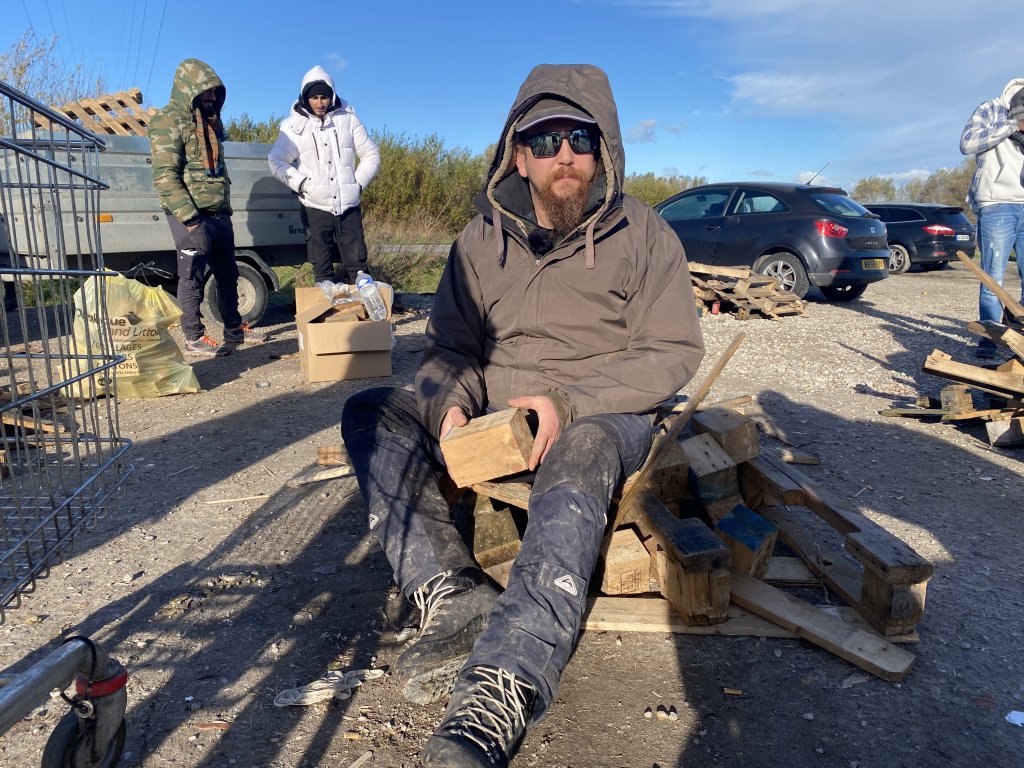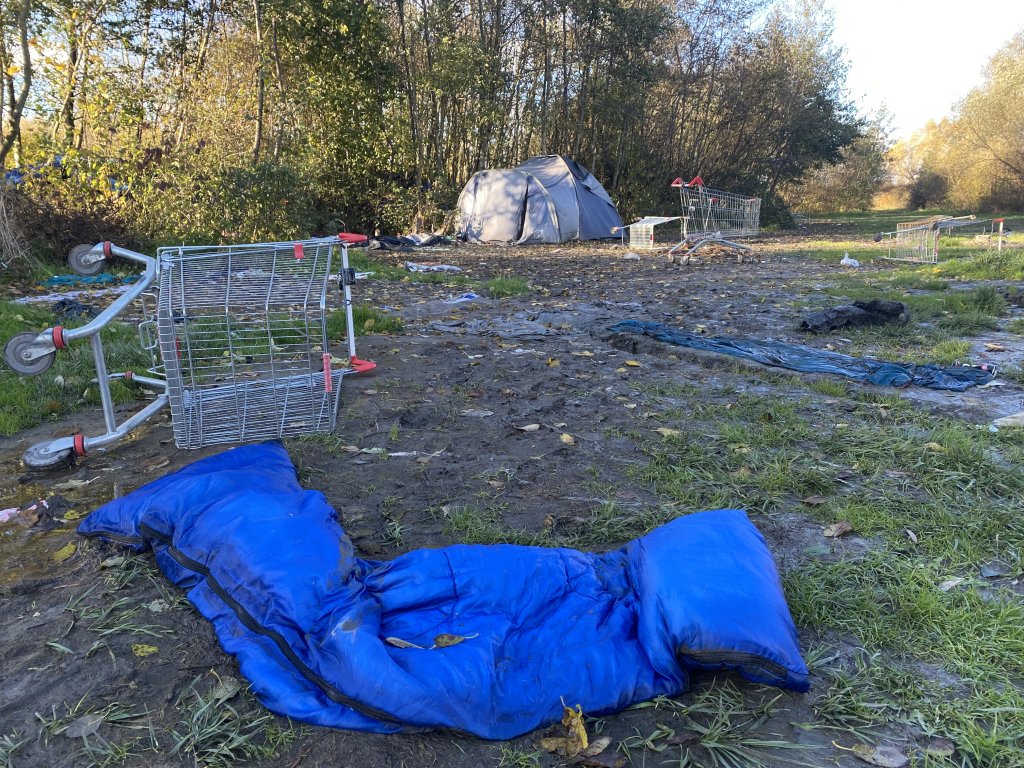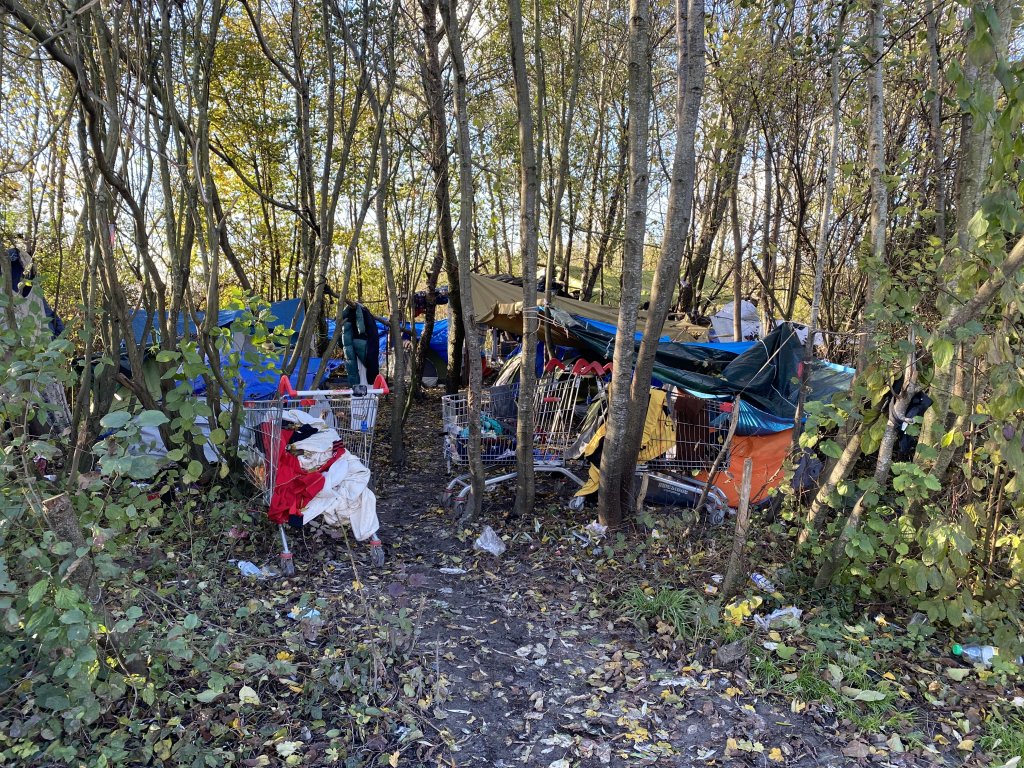In Loon-Plage near Dunkirk, northern France, hundreds of migrants live in an informal camp while waiting to cross the Channel to England. Dozens of tents are scattered among the groves, surrounded by mud and rubbish. Without support from associations, the migrants would be completely destitute.
By Leslie Carretero, special correspondent in Calais
"Look around you. It's winter in northern France and there are maybe 300 people forced to live in the forest." Geoffrey is angry. Next to this 44-year-old Briton, hundreds of migrants occupy a vacant lot in Loon-Plage, near Dunkirk, to meet the associations that came in large numbers this Wednesday, November 20. Aid workers estimate there are more than a thousand people living in the camp scattered a few meters from here, in the bushes. Most are from Iraq, Syria, Afghanistan or East Africa. All want to cross the Channel to reach the United Kingdom.
Geoffrey has just parked his vehicle. He had barely gotten out of his car, with a UK license plate, when dozens of people rushed towards his trailer loaded with pieces of wood and pallets. In just 10 minutes, his entire cargo had disappeared.

Every day, for several hours, this British man, who is not affiliated with any organization, travels the region to find wood for the migrants in the Loon-Plage camp. "I collect it from everywhere: from companies or individuals. Sometimes, I can drive 100 kilometers to fill my vehicle."
And with the cold snap hitting France this week, his activity seems vital. Because when you live on the street, wood is a precious commodity. "It creates a social space, people get together and chat around the fire. It also allows you to cook or heat water to wash," explains Geoffrey. "With the pallets, they can raise their tents or use them as tables."
Read AlsoMigrants in Calais: 'The UK is our last hope'
'I don't know where I'm going to sleep tonight'
A little further on, there’s a distribution of meals and hot drinks, led by the Care4Calais association, which also brings together a lot of people. In a single file, the migrants wait calmly to get a meal. Those who try to jump the line are quickly spotted by the volunteers who send them to the end of the queue.
In the crowd, we come across people barefoot in flip-flops looking for closed shoes; lightly dressed men stocking up on warm clothing, gloves or blankets behind a truck of volunteers overflowing with clothes; migrants warming their hands worn out by the cold over a small fire that is slowly dying out, others are collecting hygiene products distributed by Médecins du Monde (MdM).
Leaning against a garbage bin, Malik watches the coming and going of humanitarians. "I arrived in Loon-Plage earlier. I don't know where I'm going to sleep tonight, I have nothing," this 32-year-old Senegalese man sighs, visibly lost. A few minutes later, we find him wandering around the area looking for a tent.
Without the help of associations, migrants would be completely destitute. "We are dealing with people who live in great precariousness and who lack everything," Diane Léon, MdM coordinator on the northern coast, told InfoMigrants.

The medical NGO also provides consultations to sick or injured people, and organizes transfers to hospitals if necessary. "The vast majority of the pathologies we encounter are linked to living conditions on the streets: we treat dermatological problems, wounds that become infected, injuries caused by police violence or during attempts to cross the Channel," Diane Léon explained.
Read AlsoMigrant women in Calais grapple with sexual violence
'It's not a choice to live in the mud'
To get an idea of the daily life of these people, you have to walk a few minutes along the road, take a small path and cross a makeshift bridge, made with pieces of shopping carts, which overhangs a river. As you go deeper into the bushes, you can see dozens of makeshift shelters made of tents and large blue tarpaulins hung from the trees.
"That's where I sleep," Dawet says, pointing to his simple home, which he sometimes shares with two or three companions in misfortune. This 28-year-old Ethiopian has been surviving in this camp for several weeks. "There is too much rain, too much mud, it’s too cold," the young man complains. The ground around his tent is littered with rubbish – no waste removal service has been set up by the authorities. Shoes, T-shirts and a child's hat are spread out on tree branches.
Regularly, the migrants have to rebuild their camp set up below a highway. Every week, the police dismantle the informal living space, confiscate the migrants' tents and belongings. And tirelessly, the camps rebuild.

"This is no way to treat people. The situation is getting worse and worse, the dehumanization of these people is reaching new heights. But it is not a choice to live in the mud," Geoffrey, the British volunteer, said.
Hunger, cold, lack of hygiene, police harassment… all these factors sometimes lead to violence between different communities. The Loon-Plage camp has been the scene of gunfire or knife attacks several times in recent years.
"We talk about tensions in the camp but the violence is also, and above all, institutional," Diane Léon, from MdM, explained. "The State is giving a security response to a humanitarian problem. People have no solutions because the authorities do not want to welcome them and on the other hand, they do not let them leave for England. The response must be to welcome them and open legal immigration channels."
